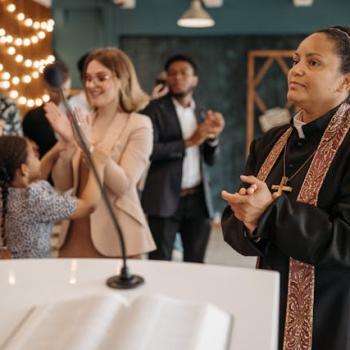When I was in fifth grade, I didn’t know I would spend the majority of my adult life in leadership. All I knew was the world I associated with my everyday life: school days, awash in my navy and blue jumper with white blouse (peter pan collar, of course) navy blue uniform sweater, white knee socks, and black penny loafers. My world was long division, copying spelling words, social studies, and Girl Scouts and piano lessons after school. Me, a leader? No concept. No clue of what it would be like, let alone that good ministry leadership happens when nobody is looking.
In the midst of this world, not expecting anything out of the ordinary, my mother dropped some leadership advice that still resonates with me. I can still remember sitting at our kitchen table as she asked me where my school principal was that day. She was a tough-talking Dominican nun, a Bronx transplant nicknamed the “White Tornado.” She’d been a staple in the area for over a decade by the time I started attending that school, and if there was one thing she was known for, it was keeping things together.
When I told my mom she wasn’t at school that day, I didn’t expect my mom to have much of a response. It wasn’t a moment for me to anticipate something profound in its contents. The day had gone on without a hitch. Nothing extraordinary happened, there were no problems, it wasn’t special. The only thing that was different from any other day was that the principal wasn’t there.
“That’s the sign of good leadership,” my mom said. “It says something that things function as normal, the way they should, with everyone doing what they should, even when someone isn’t there.”

Ministry when nobody is looking
What I learned from my mom’s words: good ministry leadership happens when no one is looking. If we govern well, we can trust things will operate according to plan, whether we are there, or not.
The question, however, remains: what marks “governing well?”
Most of us have seen memes comparing good leadership to an iceberg. The surface of such seems small compared to the huge portion that rests below the waters. We classify the “visible” aspects of ministry leadership to the top of the iceberg. These things include public preaching, recording videos, speaking for special events, hosting conferences, and leadership celebrations. These things often draw people to leadership…but they certainly aren’t where leadership begins and ends.
People sometimes base standards of good leadership on visible things, such as being able to preach down a room or write eloquently. These things definitely benefit, but they don’t prove competency for leadership by themselves. In different ways and different styles, what proves a good leader is functionality. A group’s ability to function, whether or not a church is in our immediate line of vision, should be the goal of every Christian leader.
But much like governance, how do leaders make sure their ministries function? Let’s explore this concept together.
Church maintenance
When we think of the New Testament, we often fail to consider a few key facts. For one, the apostles of old weren’t present with the churches they founded, led, or visited most of the time. First-century apostles ran circuits between locations, spending much of their time in travel. In planning trips, churches dotted the landscape between the starting point and farthest location. On the way back, more churches marked stops. Trips often lasted for months or years, with times adjusted to handle needs and issues that different churches faced. There were no phones, internet, or video calls. Letters took months to circulate.
For churches to survive on their own, they needed to recognize the work present in the role of the apostle. When their governing leaders paid a visit, time had to be spent on administrative needs as much as personal impartation. For churches to survive, they had to be properly structured, well-ordered, and spiritually equipped. Scripture tells us that during such visits, apostles usually did the following:
- Appoint elders (Acts 14:23, Titus 1:5)
- Ordain leaders as necessary and install pastors (1 Timothy 5:22, 2 Timothy 1:6)
- Sort out disputes among leaders and members (1 Corinthians 1:10-17)
- Offer both praise and correction, especially recognizing good workers by name (Romans 16:1-16)
- Provide essential teaching (Colossians 1:28)
- Warn against false teachings and leaders (Romans 16:17-19)
None of these responsibilities quite hold our attention like performing miracles and eloquent preaching, but they are vitally important. If, as leaders, our churches aren’t structured to function, they won’t survive in our absence. Those who perform oversight responsibilities (bishops, apostles) should never go to a church just to do a conference. Conferences can be fun, but they must be balanced with administrative duties for churches to thrive if no one is watching.
Handling personalities
I think handling people is probably my least favorite task as an apostle. For one, it seems like it’s never ending. There always seems to be someone who doesn’t like someone or doesn’t get along with someone or…I am sure you get the picture. Whether among colleagues, congregation members, or the general tone in the church, it seems like someone always has an issue with someone else. The most challenging part of it all is figuring out which situations to ignore and which ones require address.
Contrary to popular belief, we don’t cease to be ourselves when we become Christians. We remain people with unique personalities, identities, likes, and dislikes. It is in each unique combination where our gifts lie. As the Spirit brings about sanctification (the process by which we are transformed from glory to glory and faith to faith) within each of us, we better understand just what we are called to do in His Kingdom. We are not called to conformity, but diversity.
Having said that, what God asks us to do in the church sounds almost impossible, doesn’t it? He throws a bunch of people together with differences in background and personality and says “Here, work it out!” As a result, conflict can be inevitable. In conflict, we discover who we are and where we need improvement; not to mention, we see things from other perspectives. Yes, I know this sounds all ideal and self-aware, and yes, people’s emotions tend to get the better of them in such situations. Given these realities, how do we handle such situations?
A Bible lesson on handling disputes
If any of you has a dispute with another, do you dare to take it before the ungodly for judgment instead of before the Lord’s people? Or do you not know that the Lord’s people will judge the world? And if you are to judge the world, are you not competent to judge trivial cases? Do you not know that we will judge angels? How much more the things of this life! Therefore, if you have disputes about such matters, do you ask for a ruling from those whose way of life is scorned in the church? I say this to shame you. Is it possible that there is nobody among you wise enough to judge a dispute between believers? (1 Corinthians 6:1-5, NIV)
When disputes arise, competent leaders (in the example above, apostles) have the job to stand as intermediaries to handle disputes. We, as leaders, should listen patiently and avoid people, as often as possible, to find mature solutions to such problems. These might include:
- Accepting one another’s differences (1 Corinthians 12:12)
- Avoid offending others (Matthew 17:27)
- Practice forgiveness (Colossians 3:13)
- Find creative ways to work together or work apart (Ecclesiastes 4:9-12, Acts 15:36-38)
- Refrain from gossip (Proverbs 16:28)
Some people successfully resolve conflicts. Other times, people continue to dislike one another from a distance. In either situation, conflicted members need to remember their focus should be church service, not liking one another. As leaders, we bring conflicting members back down to earth by reminding them their situation – and their personal issues – are not the center of the universe.
Modeling Biblical leadership
There isn’t one singular example of Biblical ministry leadership. There are many reasons for this, but I feel the most relevant is simple: leaders face many different situations. We can’t embody only one kind of leadership because many different styles will be required throughout our ministry walk. This is why God equips us with spiritual gifts (1 Corinthians 12:1-11, Romans 12:3-8) as well as different functions and abilities in addition to our ministry calling. In His wisdom, God equips us for these different situations.
It’s important to note that ministry leadership is seldom accomplished alone. I once had a leader who said, “There are no cowboys in the Kingdom.” Effective leaders connect with others; this can be accomplished in a variety of ways. Working with other leaders doesn’t have to mean joining someone else in a vague arrangement or being part of a huge ministry network or conglomerate. We all need someone to help out when we are tired, to assist with projects, to offer a listening ear, and yes, to help us remain accountable (often when we want to the least). Everyone needs someone to check in on them, ask if they need prayer, had any water or enough to eat today, and support them in good and bad times. Leaders need community as much as anyone else.
Examples of ministry leadership relationships
- Moses had Aaron, Miriam, Jethro, and tribal elders (Exodus 18:13-26, Numbers 12:1)
- Jesus had the twelve disciples, plus a special connection with Peter, James, and John (Matthew 10:1, Matthew 17:1-3)
- The kings of Israel were guided by prophets, particularly Samuel and Nathan (1 Samuel 19:22, 2 Samuel 12:1-15)
- The Apostle Paul worked with a number of leaders, especially Timothy, John Mark, and Barnabas (Acts 12:25)
If you aren’t sure how to handle something, talk to another leader. Whether it’s due to having a hard time or needing impartation, having other leaders in your life ensures two things. First, that you will receive what you need from God. Second, if someone else needs to step in and assist in your absence (or inability to handle something), there will always be someone there.
Don’t neglect ministry delegation and instruction
Delegation can be hard for leaders, especially if they are used to doing things on their own. It’s easy to think the entire world will fall apart if we don’t do it ourselves. This leads to burnout and isolation, not to mention it doesn’t give others the opportunity to serve God by using their gifts. If we want the church to function when we aren’t around, we must ensure we have people in place to handle necessary matters, and give them the opportunity to do so.
If we are to have competent people in our absence, such requires training. It’s easy to assume everyone knows what they should be doing (when they very well may not). Training is typically not the most fun part of ministry development, but it is a requirement for anyone who desires to serve. Whether someone has outside training or not, learning how to best serve in the immediate ministry location is still required. Learning how to serve and serve with a leader is crucial as one develops specific style and manner for required work. If you aren’t sure where to start, I recommend my books, Ministry School Basic Training: Be All That You Can Be in God’s Army (A Guide for Lay Membership) and Ministry School Boot Camp: Training for Helps Ministries, Appointments, and Beyond.
Final thoughts on leading when no one is looking
Ministry leadership must be real, active, and alive whether or not the leader – or the followers – are looking. Leadership is not a person; it is a principle, or perhaps, a series of principles that keep things motivated for operation. Creating ministry connections that include trustworthy individuals to lead in one’s absence starts with relationship; one that is spiritual and practical, duly prepared and trained for work. My childhood principal mirrored this idea, which my mom pointed out. Now, down the line, I can see the benefit in the wisdom present in the thought. It’s great to love the crowds, but ministry is made by working that iceberg, one task at a time. Great ministry is made by leaders who aren’t afraid to step up, lead, and do so in a way that makes a lasting impact…especially when nobody is watching.














